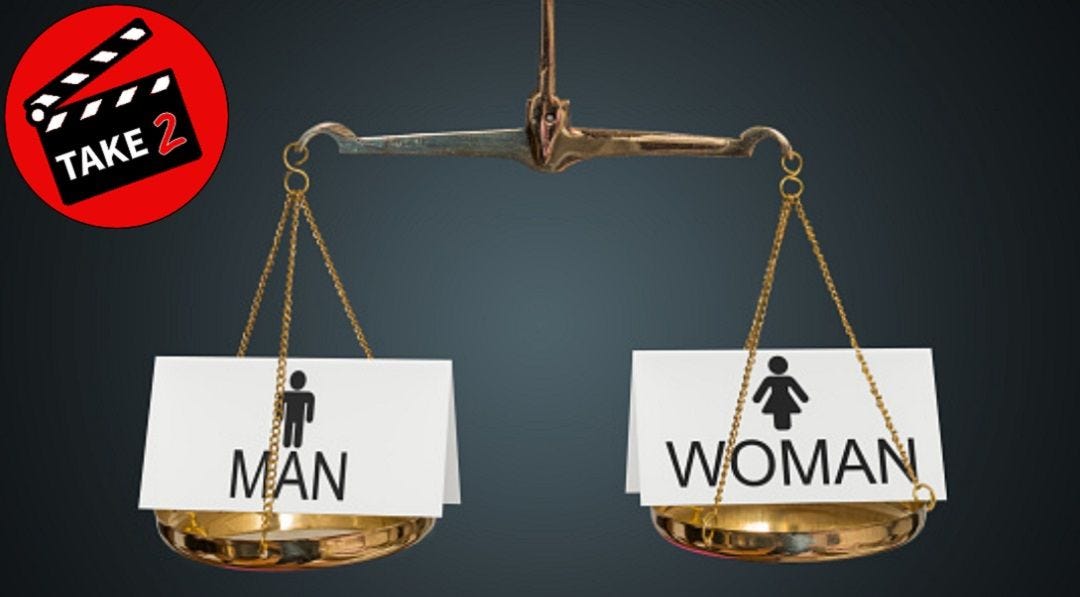The law is not enough
But it’s still where we have to start
Last week I wrote about why winning back schools for sex-realism matters, and promised I’d return to the importance of the definition of sex in law. But as I’ve written this week’s issue, I’ve found myself explaining why the law isn’t enough, though shoring it up is still where I think we have to start (and will return to that down the line!).
f you are not a subscriber to my weekly newsletter, you might like to sign up for free updates. I hope that in the future you might consider subscribing.
First, I accept that I have a lawcentric viewpoint. I spend a significant part of my time talking to lawyers, and work for an organisation that grew out of the landmark Forstater judgment. There are other ways to think about the question of who counts as a man or woman, and how to (re-)establish a common understanding of the two sexes, most obviously scientific, public-opinion and political.
Second, even when the law is fine, it is surprisingly often ignored. People tend to save handwringing about “the rule of law” for African slums and South American favelas; in fact, an awful lot of law even in rich, safe countries is worth no more than the paper it is written on.
The (accurate, sensible) meanings of the words “sex”, “male” and “female” are established in UK common law, and there are many relatively obscure places where they appear in statute, from the school admissions code to regulations on the searching of children. And yet it’s incredible how many clear rules about sex are constantly broken with impunity, including by people who think they’re doing the right thing.
Here’s a single, nerdy example. The Education (Pupil Registration) (England) Regulations 2006 require all schools to keep admission and attendance registers, with specified particulars including sex. There’s no wiggle room: this is a statutory duty, and children cannot have gender-recognition certificates. Their sex is their sex: there is no other possible meaning to these regulations. And yet many schools are overwriting children’s sex with their gender identity in school records on demand—a clear breach of their statutory duties, but without penalty and in many cases under the impression that this is what they are supposed to do.
This hasn’t happened for no reason: it’s happened because of lobbying by LGBT groups. They push what campaigners like me call “Stonewall Law”—a distorted doctrine according to which the UK already has legal self-ID, including for non-binary identities, which is then pumped into institutions which deal with sex in any respect where sex matters. That includes schools, public toilets, sports, prisons, workplaces and more. Many such institutions, perhaps most, have gone part or all of the way to self-ID—even though the law doesn’t say they have to, and in many cases specifically says they mustn’t. It’s reasonable to ask how a focus on the letter of the law can help when we are in a situation fairly characterised as “lacking the rule of law”.
But to my mind, the biggest problem with the law as it relates to sex is the remarkable extent to which lobbyists are succeeding in changing the meaning of laws without ever changing their words.
Take the Equality Act, the centrepiece of UK anti-discrimination law. In it, the words “man” and “woman” are glossed as meaning “male and “female”. The explanatory notes reinforce this biological definition by saying that it is lawful to provide a service only to one sex when only that sex needs the service, for example, providing cervical-smear tests only to women. They also say that it is lawful to separate the sexes in situations where people of one sex might “reasonably object” to the presence of a person of the other.
This has to mean bodies and biology. What could possibly be reasonable about delineating the group of people with whom you object to sharing intimate spaces with according their ineffable feelings about themselves or their paperwork?
And then there’s the separate protected characteristic of “sexual orientation” in the Equality Act, which depends on the definition of “sex” (attracted to the same sex, the opposite sex or both sexes). Is there anyone in the world whose potential dating pool consists of everyone who declares a male or female identity, regardless of their body? Or of people of one sex who do not possess a government-issued piece of paper declaring them to be of the other sex, plus people of the other sex who do possess such a piece of paper?
So it’s obvious that sex must mean sex in the Equality Act, not only because words in general have meanings but because the way the words sex, male, female, man and woman are used in this particular law and many others makes no sense unless they have their standard objective meanings.
And yet there is an extremely successful movement under way to say otherwise.
The most striking instance was a judgment in a Scottish court shortly before Christmas (it may yet be appealed). Campaign group For Women Scotland had taken the Scottish government to court over a provision intended to increase the representation of women on company boards. An earlier challenge had succeeded against a previous version of the law, in which “women” was taken to mean anyone who identified as one. For Women Scotland successfully argued that this ill-defined, mixed-sex group could not lawfully be targeted for positive discrimination.
But rather than getting rid of the law entirely, the Scottish government amended it, this time defining “woman” to mean anyone female who does not have a gender-recognition certificate stating their sex as male, plus anyone male who has a gender-recognition certificate stating their sex as female. And so FWS went back to court again, seeking to get this definition declared unlawful too.
Lady Haldane rejected their challenge and said the law could stand. In the process she ruled that “man” and “woman” in the Equality Act (specifically glossed as “male” and “female”, remember) meant the same as the Scottish government’s definition in the public-boards provision—that is, “sex as modified by a gender-recognition certificate”. She pointed to the words “for all purposes” in the Gender Recognition Act’s provision for changing someone’s sex, ignoring the list of exceptions that quickly follow. And she said that if the drafters of the Equality Act had intended to refer to biological categories, they would have put the word “biological” before “male” and “female”.
The Equality and Human Rights Commission, the statutory body that oversees the operation of equality law in the UK, also agrees that that “sex” in the Equality Act is a matter of your paperwork. In its intervention on the Scottish government’s side in the For Women Scotland case, its counsel drew an analogy between sex and the speed limit. The very idea that there was a “legal sex” separate from some other meaning of “sex”, he said, was nonsense. Sex means what the law says it means, and no other meaning is even conceivable. Just as there is no “speed limit” except the “legal speed limit”, he argued, there is no “sex” except “legal sex”.
With the usual proviso that I Am Not A Lawyer, I don’t know where to start with this. I can’t believe how many people seem to have accepted the bizarre idea that objectively meaningful differences that cannot be wished away by words simply do not exist. The difference between the two sexes is, rather obviously, objectively meaningful in this sense. If two people are stranded on a desert island, the words they use for themselves and each other—or whether they can even speak—is irrelevant to the question of whether, a few years later, it is or isn’t possible that there may be new little people on that island.
It’s noteworthy that the people who say these things don’t try it out on other material concepts—or, preferably, stop doing it when it comes to sex. Another of the protected characteristics is age, but I’ve never heard someone argue that because lawmakers didn’t write “chronological age” in the Equality Act, children can be counted as adults and adults as children.
And why stop there? Why doesn’t the government pass a law declaring the value of pi to be 3, and thereby square the circle? Or save the lives of some people who fall from height by writing a law halving the universal gravitational constant and thereby making objects fall more slowly? Or stop global warming by legislating to change the intensity of greenhouse effect? Or end a pandemic with a law slashing its “R value” (the average number of people infected by each case)?
The thinking behind the Gender Recognition Act 2004 was that a tiny number of exceptional people—clearly envisaged as those who underwent surgery to remove their sex organs, though the law didn’t specify that—could be moved from one category to another without breaking the categories. I suppose that might have worked, if the numbers remained homeopathically tiny and everyone understood that what we were talking about were exceptions, not a categorical redefinition.
After all, witness-protection programmes around the population deal with similarly tiny numbers of people to those intended to be covered by the Gender Recognition Act (lawmakers estimated 5,000 people would get certificates; so far, about 6,000 people have, making this an extremely good official prediction). And the existence of these people doesn’t destroy government databases and documents that record everyone else’s true identity, or the very idea of identity documents.
But the more I think about it, the more I think that it couldn’t have worked. The whole idea was that these exceptions were “living as” members of the opposite sex, and that idea dates back to a time when the rules governing behaviour of the two sexes were far more rigid and distinct.
When Einar Wegener, aka Lili Elbe (the “Danish Girl” of the eponymous 2015 film starring Eddie Redmayne) said he wanted to “live as a woman”, he meant working as a shop girl, growing and perming his hair, wearing makeup, putting on dresses and going to balls where men would hopefully flirt with him, and getting engaged to a man (Wegener died of complications from his genital surgery before they could actually marry). In his autobiography he says his dearest wish was to experience “the last fulfilment of a real woman; to be protected from life by the sterner being, the husband”.
He doesn’t mention anything about the rights that being treated as a woman would have lost him at the time—to do with voting, owning property, joining the professions, inheritance and so on. Presumably those didn’t matter to him, at least not by comparison with a whole lot of behaviours and possibilities that at the time were genuinely ruled out for anyone male. I don’t know why he so badly wanted the perm and the lipstick, the flirting and marriage to a man, though I can guess. But whatever the reason, the fact is that he couldn’t do those things unless he somehow got himself classified as a woman.
But nowadays, at least in rich countries, moving from one sex category to the other makes very little difference to either such rights or such conventions. Everything Einar said he wanted is now an option for men without them having to claim to be women, and the two sexes are no longer treated differently in law except when that is justified by actual sex differences.
The truth is that what Einar wanted was not to live as a woman, but to be taken to be a woman by others. And that requires the rest of us to play along. A man can wear a dress to a ball, but that doesn’t mean the straight men he desires will want to kiss him. Likewise, the “sterner being” he imagines marrying gets a veto over who is a potential candidate for the role of helpless little wifey.
So I don’t know any more who these exceptions are. I don’t know what moving category is intended to give them, or how they are to be vetted and granted the status of exception. I think that unlike the people in witness-protection programmes, they break legal categories.
If you would like to become a paid subscriber and receive full access to my weekly newsletter, you can sign up here.
Next week: why I think the law is where we have to start, all the same!





